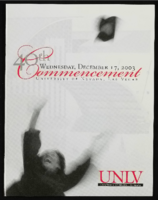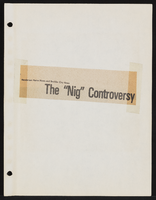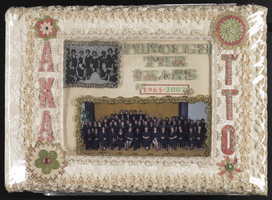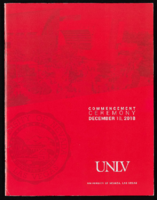Search the Special Collections and Archives Portal
Search Results

Gabriel Garcia oral history interview: transcript
Date
Archival Collection
Description
Oral history interview with Gabriel Garcia conducted by Monserrath Hernandez and Barbara Tabach on November 13, 2019 for the Latinx Voices of Southern Nevada Oral History Project. In this interview, Garcia discusses his early life in Arizona and moving to Las Vegas, Nevada in 1984. He remembers attending a sixth grade center, the Pacific Engineering and Production Company of Nevada (PEPCON) explosion, and attending Las Vegas High School. Garcia talks about Mexican culture in Las Vegas, car clubs, and becoming a graphic designer. Lastly, Garcia discusses his involvement with the Association of Latino Professionals for America, and the idea of diversifying the professional workplace.
Text

University of Nevada, Las Vegas (UNLV) 40th commencement program
Date
Archival Collection
Description
Commencement program from University of Nevada, Las Vegas Commencement Programs and Graduation Lists (UA-00115).
Text

June Monroe and Kazuko Atomura oral history interview: transcripts
Date
Archival Collection
Description
Oral history interviews with June Monroe and Kazuko Atomura conducted by Cecilia Winchell and Stefani Evans on July 14 and July 19, 2022 for Reflections: the Las Vegas Asian American and Pacific Islander Oral History Project. In the first interview, Kazuko Atomura describes her childhood in Taiwan and Tokyo, Japan, and shares both happy and difficult mememories of that time. Atomura eventually moved to Los Angeles, California, where she reconnected with a man she previously met in Japan. She married him and together had their daughter, June Monroe, and another son while living in Corpus Christi, Texas. After difficult medical procedures involving Atomura's husband and Monroe's younger brother, Brian, the family relocated to Las Vegas, Nevada. Monroe recalls attending Las Vegas High School and Bonanza High School, and the struggle of making new friends as a young person. In the second interview, the mother and daughter discuss racism, discrimination, and identity. Kazuko Atomura recalls her many experiences with discrimination as a result of both her appearance and language barriers. June Monroe discusses how she came to be proud of her Japanese heritage, while Atomura discusses some of the community activities she has been involved in since living in Las Vegas including the Japanese Culture Club and odori dancing. Then, both Atomura and Monroe discuss Monroe's brother, Brian, who received two kidney transplants; one from Monroe's father and one from Monroe herself. Atomura talks about the shrines she has built for Brian, the experience of him being on dialysis, care taking, and his final days. Monroe shares about her activism with organ donation, being regularly involved with the Nevada Donor Network and helping to pass significant pieces of legislation within the area of organ donation.
Text

Binder of news clippings and correspondence regarding the controversy over a Hoover Dam plaque honoring the dog mascot of damsite workers (contains racist materials)
Date
Archival Collection
Description
From the Roosevelt Fitzgerald Professional Papers (MS-01082) -- Personal and professional papers file.
Mixed Content

Epilogue: UNLV Yearbook, 1980
Date
Description
Yearbook main highlights: schools and departments; detailed lists with names and headshots of faculty, administration and students; variety of photos from activities, festivals, campus life, and buildings; campus organizations such as sororities, fraternities and councils; beauty contest winners; college sports and featured athletes; and printed advertisements of local businesses; Institution name: University of Nevada, Las Vegas
Mixed Content

Nevada Library Notes
Date
Description
Nevada Library Notes, Vol. 1-4 issued by the Nevada State Library. Materials about the news of library activities and articles for publication by Nevada librarians. It also contains minutes of the 18th annual convention.
Text

Alpha Kappa Alpha Sorority, Theta Theta Omega Chapter scrapbook: "Through the years"
Date
Archival Collection
Description
From the Alpha Kappa Alpha Sorority, Incorporated, Theta Theta Omega Chapter Records (MS-01014).
Mixed Content

University of Nevada, Las Vegas (UNLV) Fall 2018 commencement program
Date
Archival Collection
Description
Commencement program from University of Nevada, Las Vegas Commencement Programs and Graduation Lists (UA-00115).
Text

Las Vegas Westside: newspaper clippings, community programs, and correspondence
Date
Archival Collection
Description
Folder of materials from the Mabel Hoggard Papers (MS-00565) -- Civic engagement file. Las Vegas Westside newspaper clippings, community programs, and correspondence. This folder includes a program for a tribute to Ruby Duncan; Operation Life Community Press newsletter, Year 1, Volume 4, March 1978; Westside Council summary; Westside Federal Credit Union Education Committee records; and Nevada Equal Rights Commission letters and amended statistical report, March 16, 1978.
Mixed Content

Mabel Hoggard: community interest materials (folder 1 of 3)
Date
Archival Collection
Description
Folder of materials from the Mabel Hoggard Papers (MS-00565) -- Personal papers file. This folder contains newspaper clippings, jewelry designs, a "Basic Principles of Parliamentary Law and Protocol" booklet by Marguerite Grumme (not digitized in its entirety), event programs (including Las Vegas school graduations and reunions), "Nevada Nuclear Waste Storage Investigations" booklet (November 1980), "Black Women: The Unsung Heroines, Black History Week 1979" booklet, and other miscellaneous booklets (not all are digitized in their entirety).
Mixed Content
